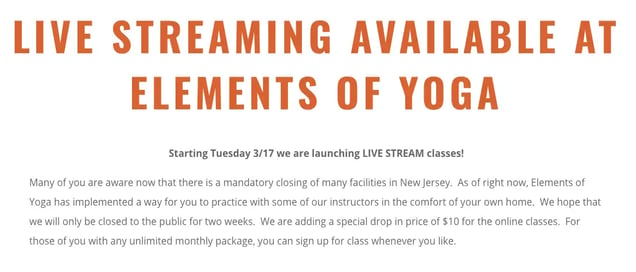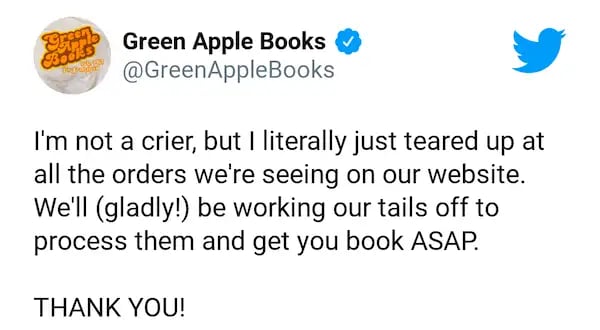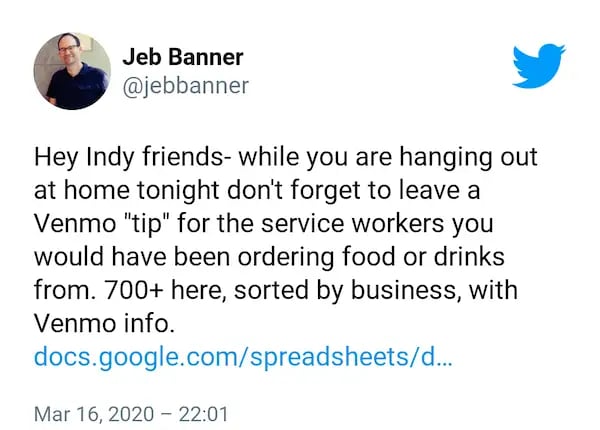The economy is in freefall. Businesses are hurting, and so are their customers and their employees.

And if you’re stuck at home, but you want to help — we’ve got you.
We’ve been talking to people across the country who are developing strategies to lift up businesses and workers around them, and we’ve compiled their ideas in this brief report on how to help your fellow humans.
Below, we’ll identify:
- 4 consumer-facing industries that are most affected, and
- How you can support businesses and workers in those industries
1. Food and Drink
With most consumers confined to their homes, restaurants, bars, and markets are dealing with huge drops in foot traffic.
What you can do:
- Order delivery and curbside. Restaurants that can’t host diners can still deliver, and many have even launched new curbside pickup programs. In Minnesota, a local CBS station built an interactive map of all the restaurants offering curbside pickup.
- Buy “dining bonds.” A group of NYC restaurants launched SupportRestaurants.org, which sells “dining bonds” — discounted gift certificates redeemable after a set timespan (if you can’t find dining bonds, gift cards are good, too).
- Contribute to “virtual tip jars.” Service workers in Indianapolis — many of whom are still reliant on tips for income — built a “virtual tip jar” by compiling and circulating a spreadsheet of their Venmo handles that enables customers to keep tipping.
2. Personal Care
As consumers self-quarantine, barbers, manicurists, makeup artists, and personal trainers can no longer get close to their clients.
What you can do:
- Rent equipment and subscribe to online “tutorials.” In Houston, several local gyms are renting out kettle bells and other workout equipment and producing online workout tutorials to help members replicate their gym classes at home.
- Attend virtual classes. The Elements Hot Yoga studio in Charlottesville, VA, started hosting yoga and meditation classes virtually over Zoom for its members (it also allows non-members to join for $4 per session).
- Schedule 1-on-1 virtual appointments. A Scottsdale, AZ, makeup studio called The Sparkle Bar is launching a virtual beauty studio that will offer personalized, 1-on-1 consultations for its clients.

3. Retail
Many brick-and-mortar retailers have been forced to close their doors, and some independent e-commerce sellers are struggling with price and product availability manipulation on big platforms like Amazon.
What can you do:
- Buy directly from brands. An independent bookstore in Kansas called The Raven Book Store is moving its literary festival online, and local book sellers across the country are launching new delivery programs to stay in business.
- Buy from community-focused aggregators. SnapBar — a startup in the Seattle area that we told you about this week, which sells photo booth rentals for events — launched a direct-to-consumer subscription box called Keep Your City Smiling that sells gift boxes filled with products from struggling local businesses.

4. Leisure, Recreation, and Vacation
With large event venues, museums, and hotels on lockdown due to restrictions on large gatherings, performing artists, tour operators, and other hospitality businesses are struggling to stay in business.
What you can do:
- Go on virtual tours. Museums from the Louvre in Paris to the Metropolitan Museum in New York are attracting visitors to their digital tours, and live-streaming platforms like Facebook Live and Alibaba’s Taobao Live are making it easy for even small tourist destinations to offer virtual visitation.
- Attend online concerts. The Dropkick Murphys started a trend when they live-streamed their annual St. Patrick’s Day concert instead of performing live. Virtual concerts range from experimental shows put on by pop star (Erykah Baidu’s charging $1) to desperate continuations of current tours (Nashville up-and-comer Kalie Shorr is charging $5.99 per show)

And plenty of people need help beyond these industries
In fact, many of the people who need help the most aren’t working at all.
Here some other groups of people who need assistance, and some ideas about how you could help provide it:
- You can donate money to underemployed gig workers, recently laid-off hourly workers, or unemployed service workers with peer-to-peer wealth distribution platforms like Leveler
- You can help the elderly, disabled, and immunocompromised by delivering their groceries as a “shopping angel”
- You can use the Nextdoor app to share tips and resources between neighbors who are quarantined
If you have ideas about other ways customers can make conscious consumption choices, tweet @TheHustle. We’ll update this guide with your ideas.

